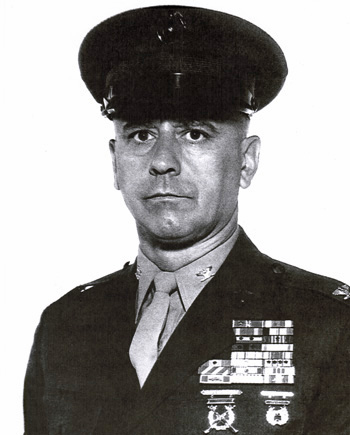
|
Joseph Sleger, Jr. |
 |
|||
| Rank, Service | ||||
Colonel O-6, U.S. Marine Corps |
||||
| Veteran of: | ||||
|
||||
| Tribute: | ||||
Joe Sleger was born on December 18, 1927, in Green Bay, Wisconsin. He enlisted in the U.S. Marine Corps on April 10, 1945, and then completed basic training at Parris Island, South Carolina, and infantry training at Camp Lejeune, North Carolina, but the war ended before he saw combat. Pvt Sleger transferred to Camp Pendleton, California, in August 1945, and then to Hawaii in September 1945. In October 1945, he deployed to China, serving with Weapons Company, 22nd Marines of the 6th Marine Division in Tsingtao, China, until transferring to Tank Platoon, 3rd Battalion of the 4th Marines, remaining in China until returning to the U.S. in June 1947. After a short assignment with Headquarters Battalion at Camp Pendleton, Sgt Sleger served with A Company of the 1st Tank Battalion at Camp Del Mar, California, until deploying to Korea with the 1st Marine Brigade in July 1950. During the Korean War, Sgt Sleger participated in combat in the Pusan Perimeter, and later was part of the invasion force during the Inchon Landing on September 15, 1950. During his time in Korea, he also participated in combat in Ascom City, Kimpo Airfield, the Battle for Seoul, the advance to the 38th Parallel, the landing at Wonsan, the evacuation of Hungnam, and various battles in central Korea around Wonju, Hoengson, Hongchon, and Hwachon. After returning to the U.S. in June 1951, Sgt Sleger served as an instructor at the Tank School at Camp Del Mar until receiving a direct commission to 2nd Lt in February 1952, having been previously promoted through the ranks to Master Sergeant (E-7). His next assignment was as a platoon leader with B Company, 3rd Tank Battalion, and as a Combat Cargo Officer aboard the attack transport USS Magoffin (APA-199), during which time he participated in rescuing refugees and French forces from Haiphong during the 1st Indo-China War in August and September 1954. Lt Sleger next served as a Company Commander with the Infantry Training Regiment at Camp Pendleton, followed by service as Guard Officer and Executive Officer at Marine Barracks, Naval Torpedo Station Keyport, Washington, from March 1955 to March 1957. Capt Sleger served as Commander of A Company, 2nd Tank Battalion, at Camp Lejeune from July 1957 to February 1959, and then attended the Associate Armor Officer Course at Fort Knox, Kentucky, from February to June 1959. His next assignment was as Inspector-Instructor of the 2nd Ordnance Field Maintenance Company at Moline/Rock Island, Illinois, from July 1959 to July 1962, followed by Amphibious Warfare School from August 1962 to May 1963. Capt Sleger next served as a Company Commander and then Battalion S-3 of the 3rd Tank Battalion, 3rd Marine Division, in Okinawa, from July 1963 to August 1964, having participated in combat operations in the Mekong Delta area of South Vietnam during March 1964. Maj Sleger served as Battalion S-3, Battalion Executive Officer, and then as Regimental S-3 with the Recruit Training Regiment at MCRD Parris Island from September 1964 to August 1967, and then attended Marine Corps Command and Staff College at Quantico, Virginia, from August 1967 to May 1968. Col Sleger's next assignment was as G-4 Operations Officer with the 3rd Marine Division in South Vietnam from June 1968 to January 1969, followed by service as Commanding Officer of the 3rd Tank Battalion in South Vietnam from February to July 1969. He served as Assistant Director for Personnel Procurement with Headquarters 8th Marine Corps District in New Orleans, Louisiana, from August 1969 to July 1973, and then as U.S. Marine Corps Representative to the U.S. Army Armor Center/Armor School at Fort Knox from August 1973 to December 1975. Col Sleger's final assignment was at Headquarters MCB Camp Butler, Okinawa, from January 1976 until his retirement from the Marine Corps on July 1, 1978. After retiring from the Marine Corps, Joe worked for the Waterford 3 nuclear power facility near Taft, Louisiana, from June 1979 until retiring on September 1, 1990. |
||||
|
||||

